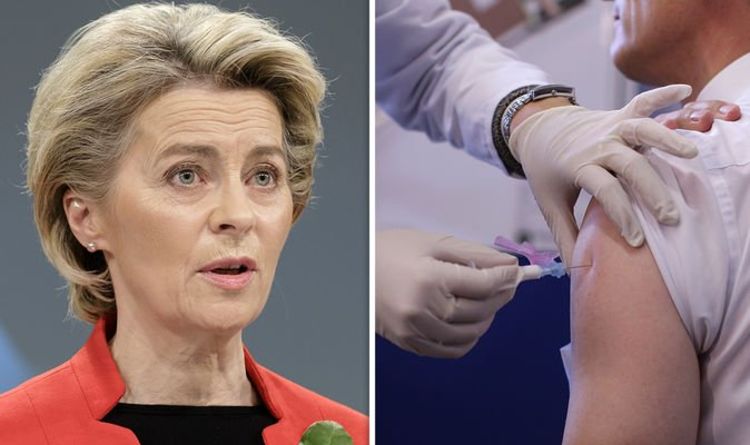EU has '40% of their vaccines in storage' says Stubb
When you subscribe we will use the information you provide to send you these newsletters.Sometimes they’ll include recommendations for other related newsletters or services we offer.Our Privacy Notice explains more about how we use your data, and your rights.You can unsubscribe at any time.
Europeans hoped for a better and happier year in 2021 – after seemingly endless months of Covid illness, deaths and pandemic-linked economic misery. However, so far, Brussels does not seem to have covered itself in glory. EU countries lag significantly behind Israel, the UK and the US in getting jabs into arms.
A number of EU members have stumbled nationally, too, with heavily criticised roll-outs of the vaccines they did manage to obtain, in Germany, Belgium, Bulgaria and beyond.
Despite these failures, the Brussels-based institutions appear to have taken solid preparations to vaccinate their own officials.
The European Commission, Council of the EU and European Parliament will open their vaccination centres for officials and MEPs on March 22, according to POLITICO.
This apparently coincides with the date the Brussels region plans to make coronavirus shots available to younger people with underlying health conditions.
Until now, jabs had mainly been available to health care workers and care home residents.
The three main EU institutions have built up their own facilities to administer vaccinations, which will officially count as Belgian vaccination centres, receiving doses from local authorities even if the jabs will be accessible exclusively to those employed by the EU institutions.
Officials from other EU bodies, such as the European External Action Service and the European Economic and Social Committee, will also receive shots from the centres.
Belgium entered Phase 1B of its vaccination strategy last week, moving from inoculating people in retirement homes and health care workers to the next priority groups.
In the Brussels region that will involve people over 75 years old this week and probably also those above 65 next week, before moving to “vulnerable” persons on March 22.
That category includes all residents above 18 years with a serious disease such as blood cancer, or people over 45 who suffer from issues such as obesity or chronic respiratory problems.
The Commission previously estimated that nearly 10 percent of its Brussels-based staff — 2,000 out of 21,000 people — qualify in the vulnerable category, but this figure is currently being revised after the latest Belgian rules on who counts as vulnerable.
A spokesperson for the Commission said: “The Commission staff will get vaccinated in line with the vaccination campaigns adopted by our respective hosting states.
“The staff members concerned have been requested to substantiate their vulnerable status with adequate documentation earlier this year.”
The Parliament and Council could not immediately say how many staff qualify as vulnerable, but confirmed the March 22 date has been “discussed” with Brussels authorities.
JUST IN: Draghi’s conflict with Merkel’s Germany threatened EU
The EU institutions could soon move to vaccinate an even broader share of their staff.
Belgian authorities plan to authorise the vaccination of “essential workers” — a criterion that could potentially be applied to MEPs and many Eurocrats — in April, though the exact date still needs to be confirmed.
The EU’s coronavirus vaccination drive was thrown into fresh chaos this week, after major European nations suspended use of the AstraZeneca vaccine over blood clot fears.
The move, described as “baffling” by British scientists, went against the advice of the EU’s medicines regulator and the World Health Organisation, who have said the jab is safe.
Germany, France, Italy and Spain announced that they would temporarily stop administering the AstraZeneca vaccine until an investigation by the European Medicines Agency (EMA) was concluded.
DON’T MISS:
Dutch referendum voters rejected closer EU links to Ukraine [INSIGHT]
EU accused of being in breach of international law over fish quotas [REVEALED]
Merkel on brink as German lawyer predicts election chaos [ANALYSIS]
Denmark, the Netherlands, Ireland and Bulgaria had already suspended use of the jab, as well as non-EU countries Iceland, Norway, Thailand and Indonesia, after reports of blood clot deaths.
More than 11 million doses of the AstraZeneca vaccine have now been used in Britain, and the Medicines and Healthcare products Regulatory Agency (MHRA) said the number of clots seen was no more than would have occurred naturally.
It added that the benefits of the jab outweighed the risks.
This afternoon, the EMA said its review concluded the Oxford-AstraZeneca COVID-19 vaccine is “safe and effective”.
The agency found the vaccine was “not associated” with higher risk of clots but it said it would continue to study the possibility of such links.
Source: Read Full Article










